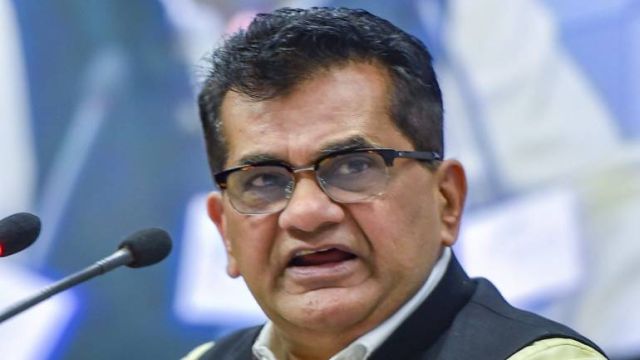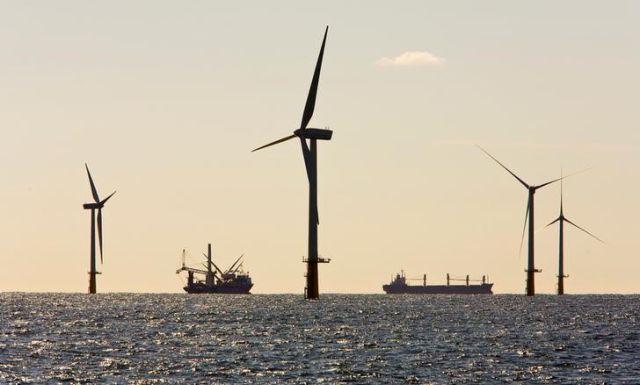
by admin | May 25, 2021 | News

Amitabh Kant
New Delhi : NITI Aayog CEO Amitabh Kant on Friday said there should be no road tax on electric vehicles to bring the ownership cost of electronic vehicles at par with combustion vehicles.
He said the NITI Aayog has suggested the states do away with road tax and issue green permits for electric vehicles.
“We have proposed to the chief secretaries that there should be no road tax for electric vehicles and green permits,” said Kant at Energy Storage India, 2019.
“When the electric vehicle revolution happens, India would be impacted in the biggest way. These initiatives are being taken to bring the ownership cost of electric vehicles at par with combustion vehicles.
“For India to successfully move away from fossil-fuel dependence, oil companies should become the energy companies of the future,” he added.
He said the government think tank had proposed a ‘pay per kilometre’ model for buses to transform the public transportation system. He said energy storage and battery manufacturing presented a huge opportunity for the country since India would be driving the growth of the auto sector in the future.
NITI Aayog Director General Anil Srivastava said there was a genuine question about the implementation and usability of the electric vehicles, but there was a massive disruption that would happen “fairly soon”.
He said even with over 20 favourable policies in place, not a single part used in electric two-wheelers was being made in India.
“A lot of policies have been made to accommodate advance products and systems, but success cannot be achieved till we reach the scale our country has to offer. With over 20 favourable policies in place, not a single part used in electric two-wheelers is being made in India,” he said.
—IANS

by admin | May 25, 2021 | Business, Emerging Businesses, Large Enterprise, Markets, Technology
 New Delhi : Announcing its Cloud offerings for India, 3D Experience major Dassault Systemes on Tuesday said its growing Cloud business in India could drive electric vehicles adoption.
New Delhi : Announcing its Cloud offerings for India, 3D Experience major Dassault Systemes on Tuesday said its growing Cloud business in India could drive electric vehicles adoption.
“Dassault Systèmes has placed the cloud at the heart of our business experience strategy which is the foundation of next-generation applications and business processes. Cloud is the optimal way to leverage the power of the 3DEXPERIENCE platform and the 3DEXPERIENCE Marketplace,” said Sylvain Laurent, Executive Vice President, Dassault Systemes.
“In India, we see a lot of potential in Cloud adoption in the Electric Vehicle (EV) and components segment supporting the EV roadmap,” Laurent added.
With transportation and mobility contributing significantly to Dassault Systemes’s business in India, the company feels that the Cloud business will accelerate EV adoption.
It said the company’s Cloud offerings will be based on a subscription model for the India market.
Each subscription includes instant access to collaborative applications embedded within the 3D experience platform such as 3D design, engineering, modelling, simulation, data management and process management on the Cloud and social communication, community building and ideation applications for collaborative innovation, among others.
With these cloud offerings, the company also hopes to cater to companies across aerospace and defence, automotive original equipment manufacturer (OEM) and suppliers, industrial engineering and retail sectors.
Dassault Systemes acquired a majority stake in 2017 in Outscale, a global leader in enterprise-class Cloud services, thereby strengthening its position as one of the fastest growing cloud companies in the world.
—IANS

by admin | May 25, 2021 | Opinions
 By Jai Sharda,
By Jai Sharda,
India’s Niti Aayog created ripples when it revealed a vision to completely switch automobile sales in India to electric vehicles (EVs) by 2030. EVs would obviously have a large impact on the environment. However, there are significant financial benefits attached to this transition as well: An EV owner could save close to Rs 37,000 (over $580) annually if India meets its renewable energy (RE) targets.
According to a paper by the Lawrence Berkeley National Laboratory, an EV owner is expected to save Rs 9,200 each year, even after including the higher capital cost of an EV over a traditional internal combustion engine (ICE) vehicle. However, some of the assumptions by the Berkeley lab were quite conservative. Building on that model, we used comparatively less conservative assumptions in terms of crude oil price, wind and solar installations.
The Berkeley study assumes no increase in the cost of international crude oil. Also, the study considers the base case as one with only 39 GW of installed solar capacity and 58 GW of installed wind capacity by 2030. However, India’s rapid progress in RE installation — 16.6 GW of solar capacity and 32.7 GW wind capacity in 2017 — itself indicates that it is well on its way to achieving an energy generation profile with a large amount of RE-based generation.
If India is able to install the targeted 180 GW solar and 110 GW wind power by 2030, the output from these two sources would be around 18 per cent of the total electricity generation. This is significant because while the average cost of electricity generated by solar and wind power are expected to fall to +/- Rs 1.71 and Rs 1.57, respectively, the cost of electricity from non-RE sources is expected to rise to Rs 4.57 by 2030, even by conservative assumptions. With this, the average cost of electricity produced in India would be around Rs 5.0/kWh.
With these costs, an EV owner would be able to save over Rs 36,700 per year in fuel costs over an ICE vehicle. With the difference in the capital costs of both vehicles expected to be in the range of Rs 1.08 lakh, an EV owner would be able to recover the incremental cost of his vehicle within just a year. In case the entire electricity consumption for EV vehicles were to be sourced from RE sources, fuel cost savings could increase by another +/- eight per cent (INR 39,636).
At a national level, too, there will be a significant financial impact of this transition to EVs. Moving to EVs would help India reduce its crude oil consumption by 360 million barrels/year. Assuming that international crude oil prices continue to grow at their historical rate of 2.7 per cent and reach around $96/barrel by 2030, the move to EVs would help India save +/- $27.8 billion annually by 2030. Given both, the national balance of trade, as well as national energy security, this would be a massive step to achieving self-reliance in the energy sector.
(Jai Sharda is Managing Director, Equitorials, a financial research and solar energy firm. He can be contacted at jai@equitorials.com )
—IANS

by admin | May 25, 2021 | Business, Investing, Large Enterprise
 New York : US auto giant Ford will massively increase investments in electric vehicles and roll out 40 hybrid and electric models by 2022, Executive Chairman Bill Ford said.
New York : US auto giant Ford will massively increase investments in electric vehicles and roll out 40 hybrid and electric models by 2022, Executive Chairman Bill Ford said.
The Detroit-based company previously said that it would invest $4.5 billion in electric products by 2020, and on Sunday it said that this number would rise to $11 billion.
“The 11 billion you’re seeing means we’re all-in now,” Xinhua quoted Ford as saying. He added that the only question is whether the customers will be there with them.
Ford believed that the answer would be positive.
According to Ford executives, the company plans to add 16 electric and 24 hybrid vehicles to its global line-up by 2022.
At the 2018 North American International Auto Show here, Ford also announced that by 2020 it would build a hybrid F-150 pickup, its bestselling vehicle.
“We want to show that the company is electrifying all iconic vehicles,” said Jim Farley, President Global Markets for Ford.
—IANS

by admin | May 25, 2021 | Business, Corporate, Corporate Governance, Economy, Large Enterprise, Markets, News
 Bengaluru : Karnataka will purchase 640 electric vehicles under the Central government’s Fame India subsidised scheme, an official said on Monday.
Bengaluru : Karnataka will purchase 640 electric vehicles under the Central government’s Fame India subsidised scheme, an official said on Monday.
“We have received approval from the Department of Heavy Industries to purchase the electric vehicles under the National Electricity Mobility Mission of the Central government’s Fame India scheme,” the statement said here.
Of the electric vehicles, 40 will be buses, 100 cars and 500 three-wheelers.
“The Department is giving subsidy up to 60 per cent under the scheme with funds to set up infrastructure to charge the vehicles across Bengaluru,” noted the statement.
The state-run transport corporation will operate the eco-friendly vehicles for the commuting public and protect the city’s environment and save fossil fuel.
The Faster Adoption and Manufacturing of (Hybrid &) Electric Vehicles (FAME) was launched in 2015 to promote eco-friendly vehicles across the country by providing fiscal and monetary incentives for adoption and market creation of both hybrid and electric technologies vehicles.
The scheme incentivises all vehicle segments, including two-wheeler, three- wheeler auto, four-wheeler vehicles, light commercial vehicles and buses.
The scheme also covers hybrid and electric technologies like a strong hybrid, plug-in hybrid and battery electric vehicles.
Its mandate is to support hybrid or electric vehicles market development and its manufacturing eco-system to achieve self-sustenance in a specified period.
—IANS





